Project Management for Health Professionals.
VerifiedAdded on 2023/05/29
|8
|1656
|347
AI Summary
This project discusses the implementation of Body Composition Monitoring (BCM) system for fluid management in human bodies in healthcare industry. It aims to improve the quality of care for patients and provide a better healthcare platform to the physicians. The project objectives, deliverables and justification are also discussed.
Contribute Materials
Your contribution can guide someone’s learning journey. Share your
documents today.
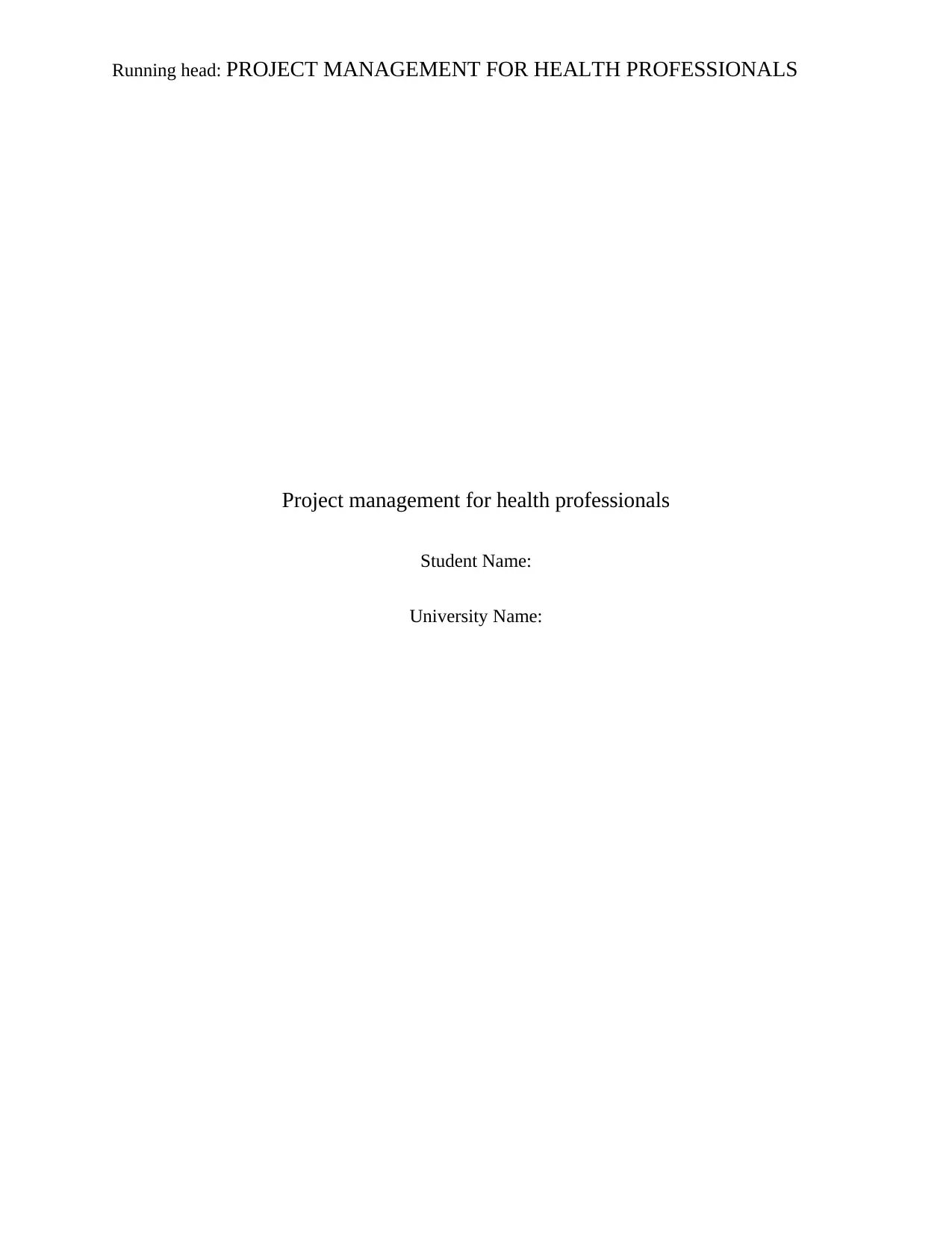
Running head: PROJECT MANAGEMENT FOR HEALTH PROFESSIONALS
Project management for health professionals
Student Name:
University Name:
Project management for health professionals
Student Name:
University Name:
Secure Best Marks with AI Grader
Need help grading? Try our AI Grader for instant feedback on your assignments.
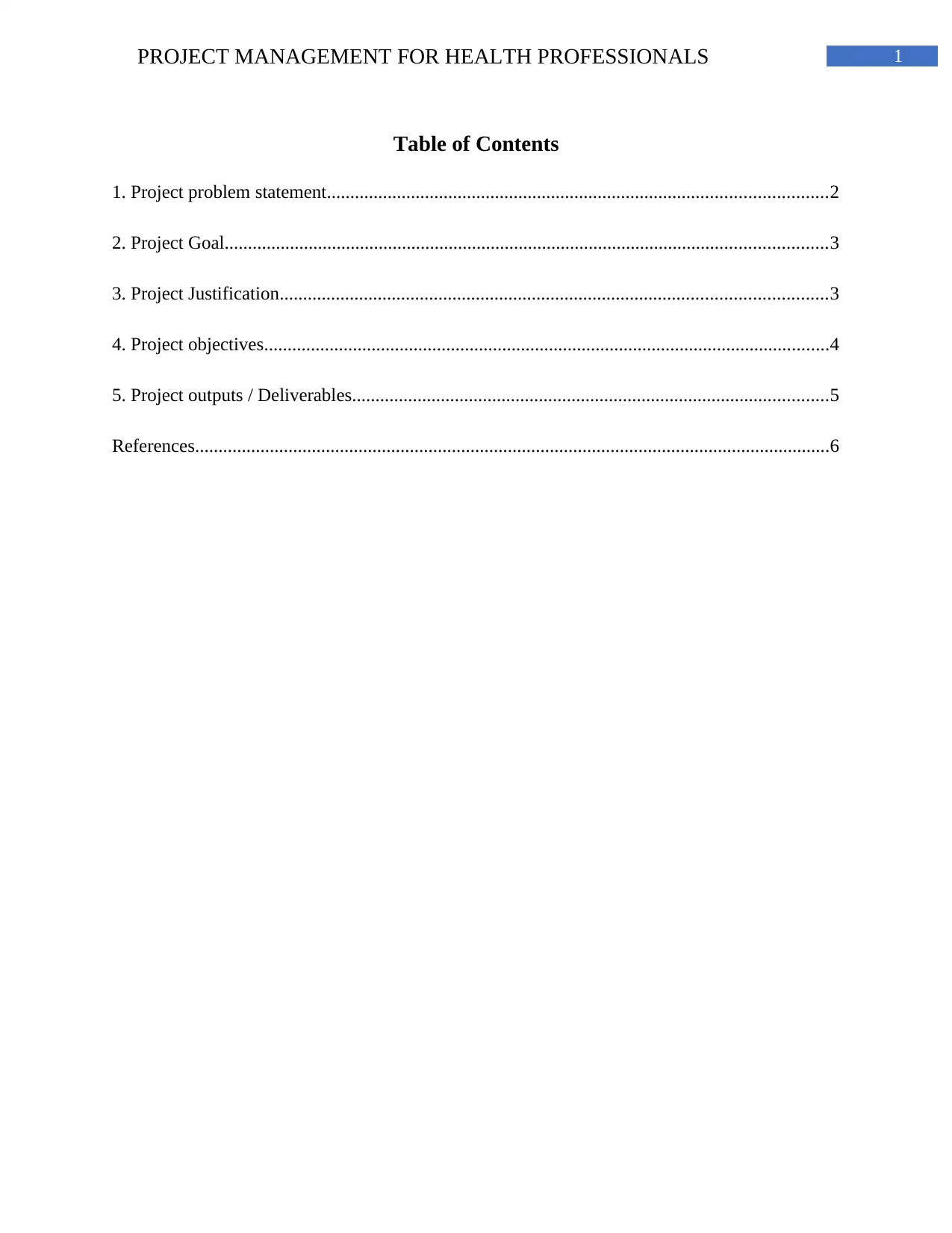
1PROJECT MANAGEMENT FOR HEALTH PROFESSIONALS
Table of Contents
1. Project problem statement...........................................................................................................2
2. Project Goal.................................................................................................................................3
3. Project Justification.....................................................................................................................3
4. Project objectives.........................................................................................................................4
5. Project outputs / Deliverables......................................................................................................5
References........................................................................................................................................6
Table of Contents
1. Project problem statement...........................................................................................................2
2. Project Goal.................................................................................................................................3
3. Project Justification.....................................................................................................................3
4. Project objectives.........................................................................................................................4
5. Project outputs / Deliverables......................................................................................................5
References........................................................................................................................................6
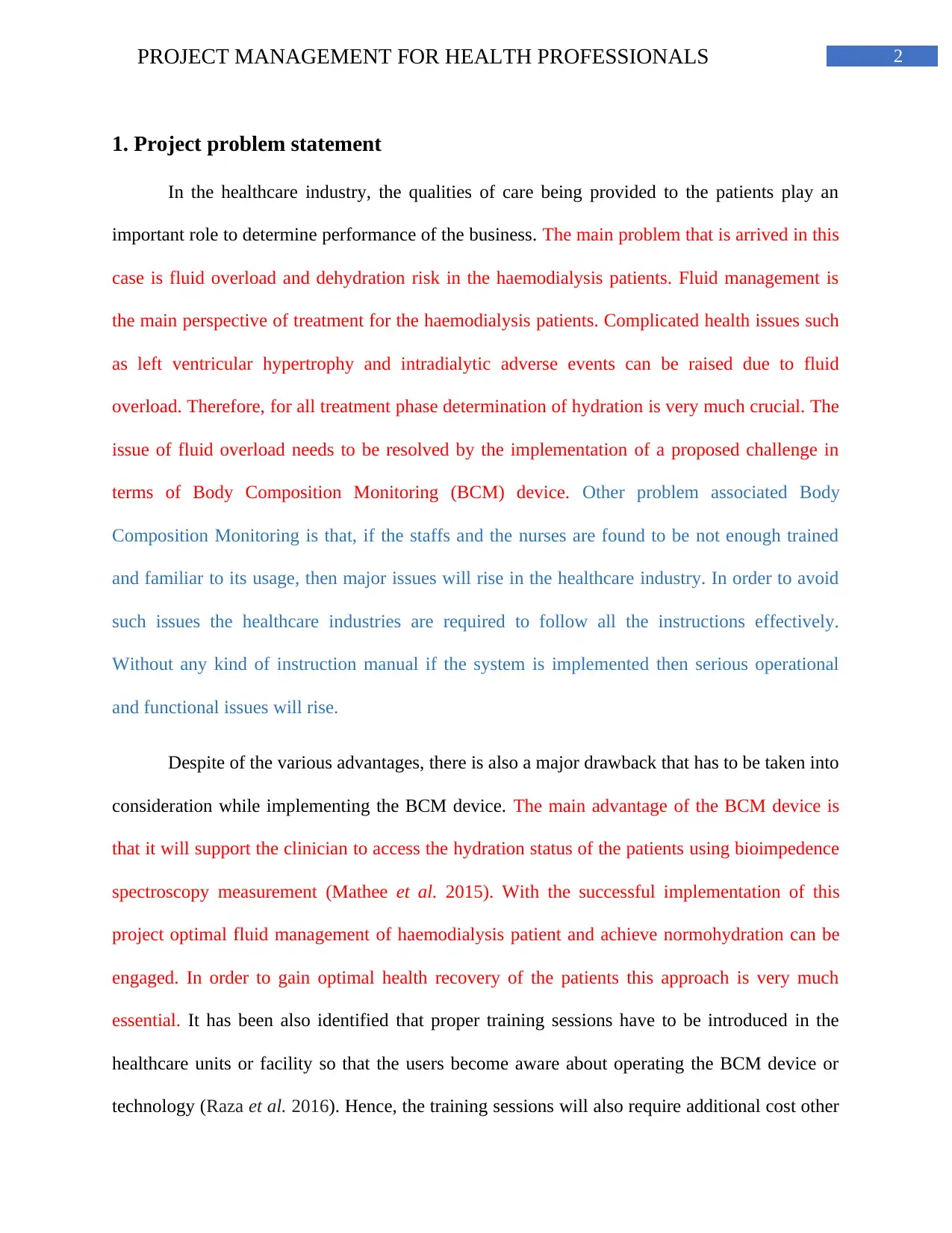
2PROJECT MANAGEMENT FOR HEALTH PROFESSIONALS
1. Project problem statement
In the healthcare industry, the qualities of care being provided to the patients play an
important role to determine performance of the business. The main problem that is arrived in this
case is fluid overload and dehydration risk in the haemodialysis patients. Fluid management is
the main perspective of treatment for the haemodialysis patients. Complicated health issues such
as left ventricular hypertrophy and intradialytic adverse events can be raised due to fluid
overload. Therefore, for all treatment phase determination of hydration is very much crucial. The
issue of fluid overload needs to be resolved by the implementation of a proposed challenge in
terms of Body Composition Monitoring (BCM) device. Other problem associated Body
Composition Monitoring is that, if the staffs and the nurses are found to be not enough trained
and familiar to its usage, then major issues will rise in the healthcare industry. In order to avoid
such issues the healthcare industries are required to follow all the instructions effectively.
Without any kind of instruction manual if the system is implemented then serious operational
and functional issues will rise.
Despite of the various advantages, there is also a major drawback that has to be taken into
consideration while implementing the BCM device. The main advantage of the BCM device is
that it will support the clinician to access the hydration status of the patients using bioimpedence
spectroscopy measurement (Mathee et al. 2015). With the successful implementation of this
project optimal fluid management of haemodialysis patient and achieve normohydration can be
engaged. In order to gain optimal health recovery of the patients this approach is very much
essential. It has been also identified that proper training sessions have to be introduced in the
healthcare units or facility so that the users become aware about operating the BCM device or
technology (Raza et al. 2016). Hence, the training sessions will also require additional cost other
1. Project problem statement
In the healthcare industry, the qualities of care being provided to the patients play an
important role to determine performance of the business. The main problem that is arrived in this
case is fluid overload and dehydration risk in the haemodialysis patients. Fluid management is
the main perspective of treatment for the haemodialysis patients. Complicated health issues such
as left ventricular hypertrophy and intradialytic adverse events can be raised due to fluid
overload. Therefore, for all treatment phase determination of hydration is very much crucial. The
issue of fluid overload needs to be resolved by the implementation of a proposed challenge in
terms of Body Composition Monitoring (BCM) device. Other problem associated Body
Composition Monitoring is that, if the staffs and the nurses are found to be not enough trained
and familiar to its usage, then major issues will rise in the healthcare industry. In order to avoid
such issues the healthcare industries are required to follow all the instructions effectively.
Without any kind of instruction manual if the system is implemented then serious operational
and functional issues will rise.
Despite of the various advantages, there is also a major drawback that has to be taken into
consideration while implementing the BCM device. The main advantage of the BCM device is
that it will support the clinician to access the hydration status of the patients using bioimpedence
spectroscopy measurement (Mathee et al. 2015). With the successful implementation of this
project optimal fluid management of haemodialysis patient and achieve normohydration can be
engaged. In order to gain optimal health recovery of the patients this approach is very much
essential. It has been also identified that proper training sessions have to be introduced in the
healthcare units or facility so that the users become aware about operating the BCM device or
technology (Raza et al. 2016). Hence, the training sessions will also require additional cost other
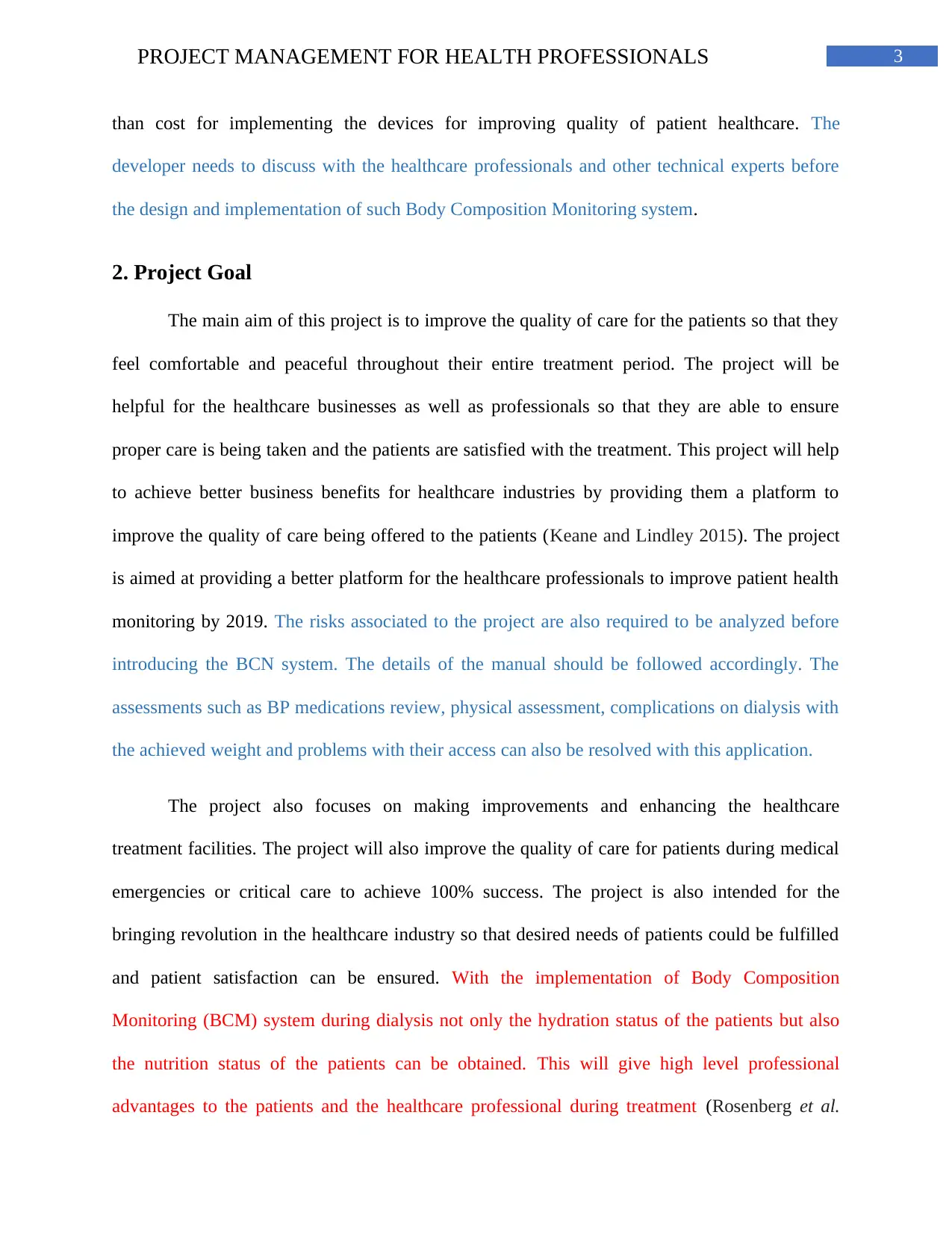
3PROJECT MANAGEMENT FOR HEALTH PROFESSIONALS
than cost for implementing the devices for improving quality of patient healthcare. The
developer needs to discuss with the healthcare professionals and other technical experts before
the design and implementation of such Body Composition Monitoring system.
2. Project Goal
The main aim of this project is to improve the quality of care for the patients so that they
feel comfortable and peaceful throughout their entire treatment period. The project will be
helpful for the healthcare businesses as well as professionals so that they are able to ensure
proper care is being taken and the patients are satisfied with the treatment. This project will help
to achieve better business benefits for healthcare industries by providing them a platform to
improve the quality of care being offered to the patients (Keane and Lindley 2015). The project
is aimed at providing a better platform for the healthcare professionals to improve patient health
monitoring by 2019. The risks associated to the project are also required to be analyzed before
introducing the BCN system. The details of the manual should be followed accordingly. The
assessments such as BP medications review, physical assessment, complications on dialysis with
the achieved weight and problems with their access can also be resolved with this application.
The project also focuses on making improvements and enhancing the healthcare
treatment facilities. The project will also improve the quality of care for patients during medical
emergencies or critical care to achieve 100% success. The project is also intended for the
bringing revolution in the healthcare industry so that desired needs of patients could be fulfilled
and patient satisfaction can be ensured. With the implementation of Body Composition
Monitoring (BCM) system during dialysis not only the hydration status of the patients but also
the nutrition status of the patients can be obtained. This will give high level professional
advantages to the patients and the healthcare professional during treatment (Rosenberg et al.
than cost for implementing the devices for improving quality of patient healthcare. The
developer needs to discuss with the healthcare professionals and other technical experts before
the design and implementation of such Body Composition Monitoring system.
2. Project Goal
The main aim of this project is to improve the quality of care for the patients so that they
feel comfortable and peaceful throughout their entire treatment period. The project will be
helpful for the healthcare businesses as well as professionals so that they are able to ensure
proper care is being taken and the patients are satisfied with the treatment. This project will help
to achieve better business benefits for healthcare industries by providing them a platform to
improve the quality of care being offered to the patients (Keane and Lindley 2015). The project
is aimed at providing a better platform for the healthcare professionals to improve patient health
monitoring by 2019. The risks associated to the project are also required to be analyzed before
introducing the BCN system. The details of the manual should be followed accordingly. The
assessments such as BP medications review, physical assessment, complications on dialysis with
the achieved weight and problems with their access can also be resolved with this application.
The project also focuses on making improvements and enhancing the healthcare
treatment facilities. The project will also improve the quality of care for patients during medical
emergencies or critical care to achieve 100% success. The project is also intended for the
bringing revolution in the healthcare industry so that desired needs of patients could be fulfilled
and patient satisfaction can be ensured. With the implementation of Body Composition
Monitoring (BCM) system during dialysis not only the hydration status of the patients but also
the nutrition status of the patients can be obtained. This will give high level professional
advantages to the patients and the healthcare professional during treatment (Rosenberg et al.
Secure Best Marks with AI Grader
Need help grading? Try our AI Grader for instant feedback on your assignments.
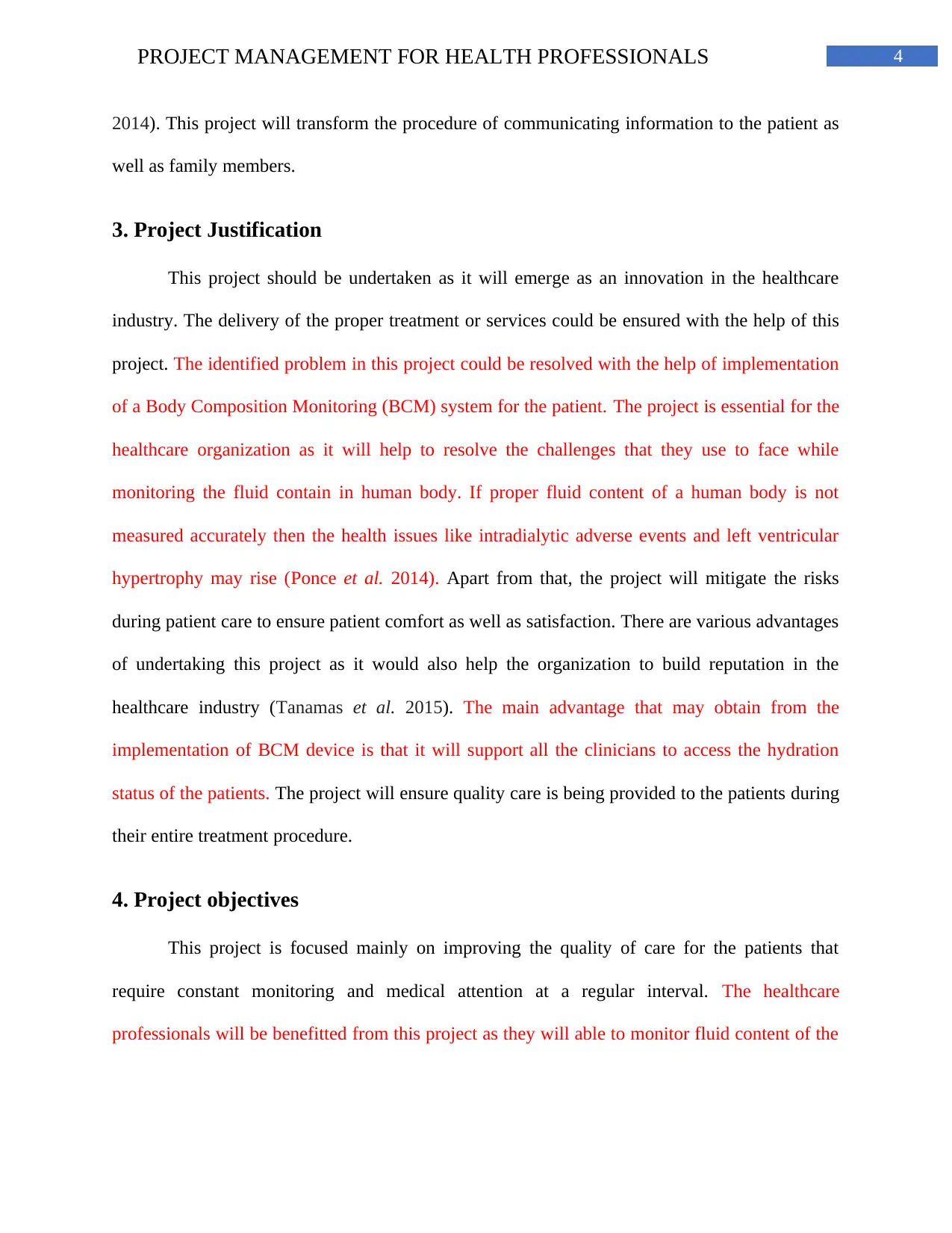
4PROJECT MANAGEMENT FOR HEALTH PROFESSIONALS
2014). This project will transform the procedure of communicating information to the patient as
well as family members.
3. Project Justification
This project should be undertaken as it will emerge as an innovation in the healthcare
industry. The delivery of the proper treatment or services could be ensured with the help of this
project. The identified problem in this project could be resolved with the help of implementation
of a Body Composition Monitoring (BCM) system for the patient. The project is essential for the
healthcare organization as it will help to resolve the challenges that they use to face while
monitoring the fluid contain in human body. If proper fluid content of a human body is not
measured accurately then the health issues like intradialytic adverse events and left ventricular
hypertrophy may rise (Ponce et al. 2014). Apart from that, the project will mitigate the risks
during patient care to ensure patient comfort as well as satisfaction. There are various advantages
of undertaking this project as it would also help the organization to build reputation in the
healthcare industry (Tanamas et al. 2015). The main advantage that may obtain from the
implementation of BCM device is that it will support all the clinicians to access the hydration
status of the patients. The project will ensure quality care is being provided to the patients during
their entire treatment procedure.
4. Project objectives
This project is focused mainly on improving the quality of care for the patients that
require constant monitoring and medical attention at a regular interval. The healthcare
professionals will be benefitted from this project as they will able to monitor fluid content of the
2014). This project will transform the procedure of communicating information to the patient as
well as family members.
3. Project Justification
This project should be undertaken as it will emerge as an innovation in the healthcare
industry. The delivery of the proper treatment or services could be ensured with the help of this
project. The identified problem in this project could be resolved with the help of implementation
of a Body Composition Monitoring (BCM) system for the patient. The project is essential for the
healthcare organization as it will help to resolve the challenges that they use to face while
monitoring the fluid contain in human body. If proper fluid content of a human body is not
measured accurately then the health issues like intradialytic adverse events and left ventricular
hypertrophy may rise (Ponce et al. 2014). Apart from that, the project will mitigate the risks
during patient care to ensure patient comfort as well as satisfaction. There are various advantages
of undertaking this project as it would also help the organization to build reputation in the
healthcare industry (Tanamas et al. 2015). The main advantage that may obtain from the
implementation of BCM device is that it will support all the clinicians to access the hydration
status of the patients. The project will ensure quality care is being provided to the patients during
their entire treatment procedure.
4. Project objectives
This project is focused mainly on improving the quality of care for the patients that
require constant monitoring and medical attention at a regular interval. The healthcare
professionals will be benefitted from this project as they will able to monitor fluid content of the
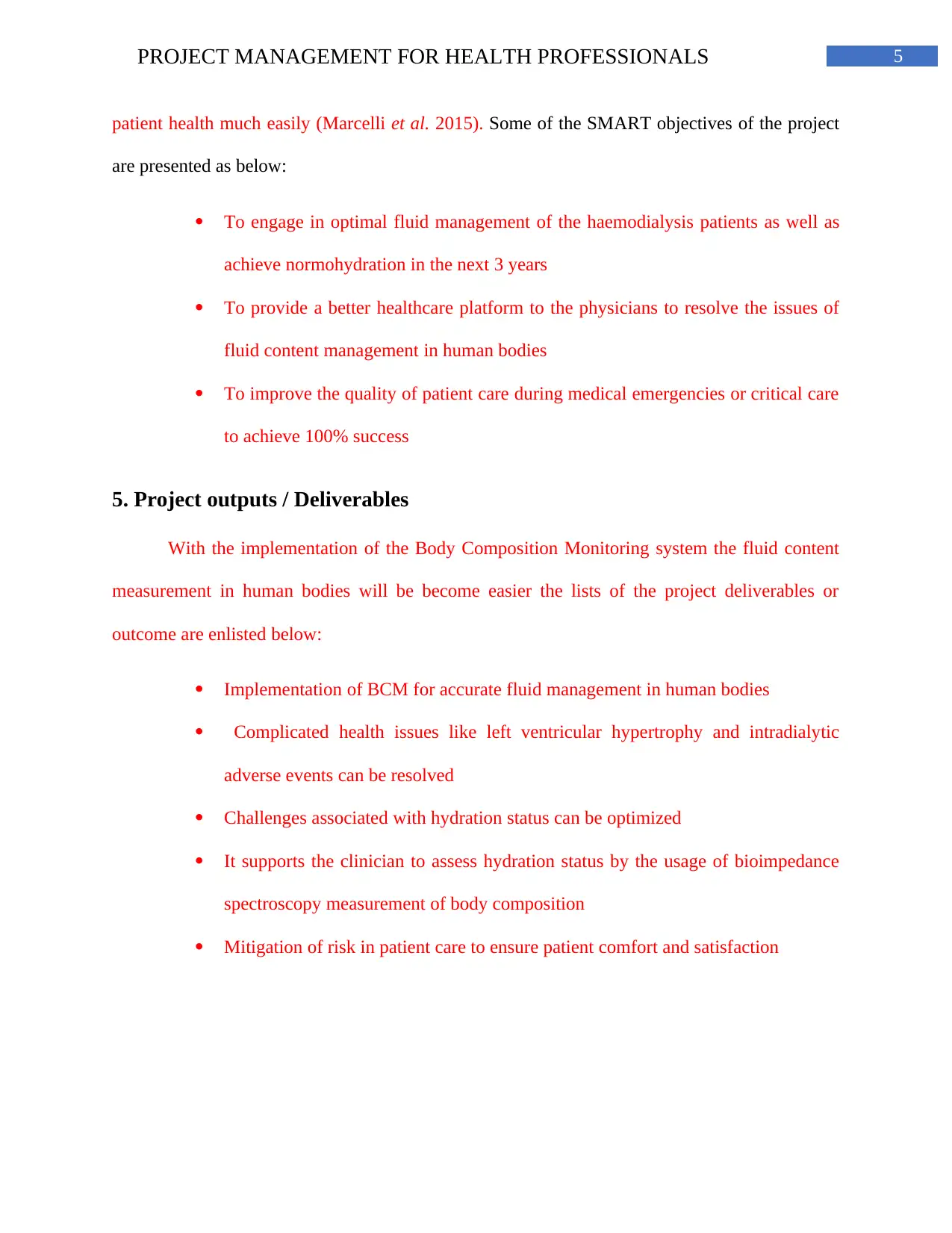
5PROJECT MANAGEMENT FOR HEALTH PROFESSIONALS
patient health much easily (Marcelli et al. 2015). Some of the SMART objectives of the project
are presented as below:
To engage in optimal fluid management of the haemodialysis patients as well as
achieve normohydration in the next 3 years
To provide a better healthcare platform to the physicians to resolve the issues of
fluid content management in human bodies
To improve the quality of patient care during medical emergencies or critical care
to achieve 100% success
5. Project outputs / Deliverables
With the implementation of the Body Composition Monitoring system the fluid content
measurement in human bodies will be become easier the lists of the project deliverables or
outcome are enlisted below:
Implementation of BCM for accurate fluid management in human bodies
Complicated health issues like left ventricular hypertrophy and intradialytic
adverse events can be resolved
Challenges associated with hydration status can be optimized
It supports the clinician to assess hydration status by the usage of bioimpedance
spectroscopy measurement of body composition
Mitigation of risk in patient care to ensure patient comfort and satisfaction
patient health much easily (Marcelli et al. 2015). Some of the SMART objectives of the project
are presented as below:
To engage in optimal fluid management of the haemodialysis patients as well as
achieve normohydration in the next 3 years
To provide a better healthcare platform to the physicians to resolve the issues of
fluid content management in human bodies
To improve the quality of patient care during medical emergencies or critical care
to achieve 100% success
5. Project outputs / Deliverables
With the implementation of the Body Composition Monitoring system the fluid content
measurement in human bodies will be become easier the lists of the project deliverables or
outcome are enlisted below:
Implementation of BCM for accurate fluid management in human bodies
Complicated health issues like left ventricular hypertrophy and intradialytic
adverse events can be resolved
Challenges associated with hydration status can be optimized
It supports the clinician to assess hydration status by the usage of bioimpedance
spectroscopy measurement of body composition
Mitigation of risk in patient care to ensure patient comfort and satisfaction
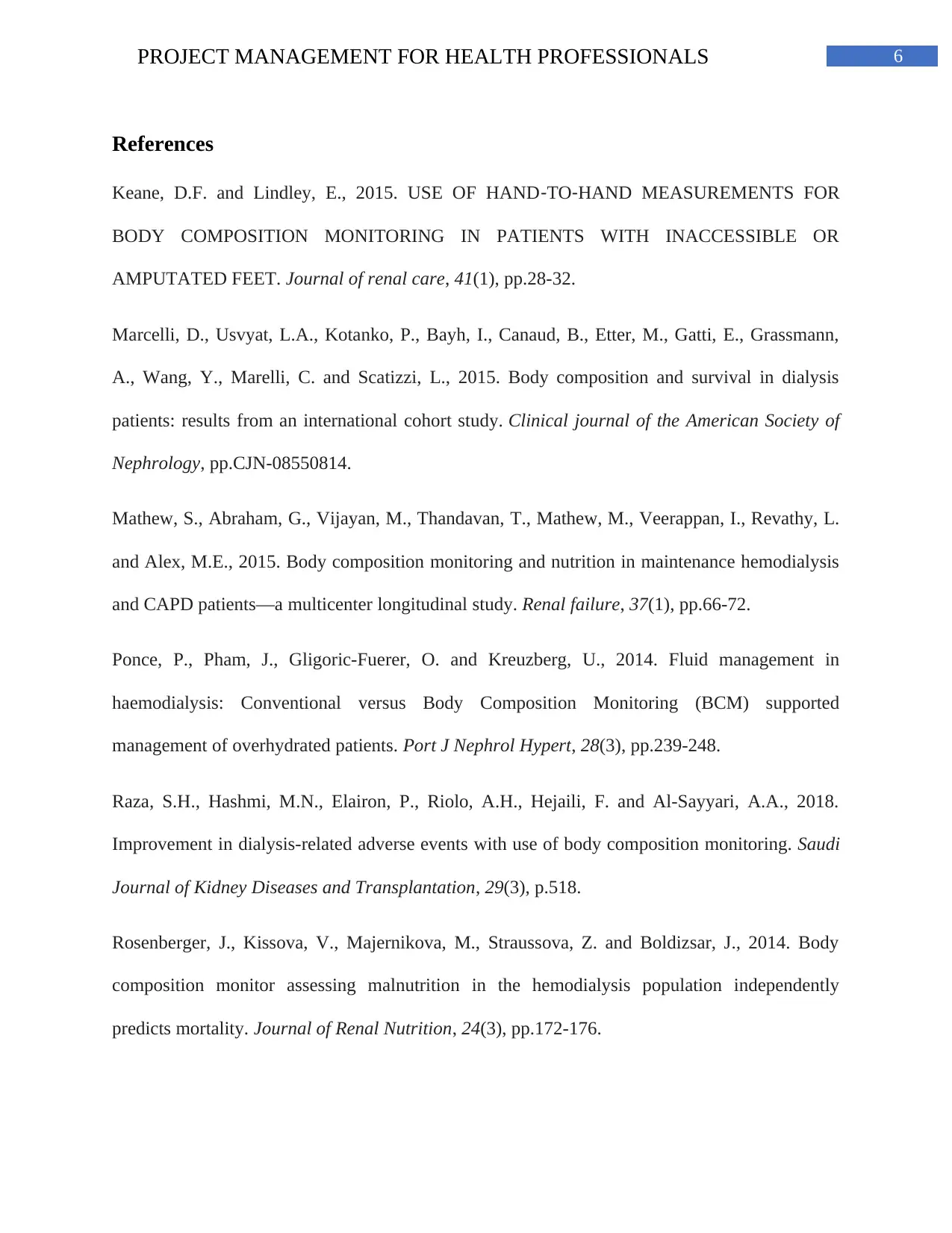
6PROJECT MANAGEMENT FOR HEALTH PROFESSIONALS
References
Keane, D.F. and Lindley, E., 2015. USE OF HAND‐TO‐HAND MEASUREMENTS FOR
BODY COMPOSITION MONITORING IN PATIENTS WITH INACCESSIBLE OR
AMPUTATED FEET. Journal of renal care, 41(1), pp.28-32.
Marcelli, D., Usvyat, L.A., Kotanko, P., Bayh, I., Canaud, B., Etter, M., Gatti, E., Grassmann,
A., Wang, Y., Marelli, C. and Scatizzi, L., 2015. Body composition and survival in dialysis
patients: results from an international cohort study. Clinical journal of the American Society of
Nephrology, pp.CJN-08550814.
Mathew, S., Abraham, G., Vijayan, M., Thandavan, T., Mathew, M., Veerappan, I., Revathy, L.
and Alex, M.E., 2015. Body composition monitoring and nutrition in maintenance hemodialysis
and CAPD patients—a multicenter longitudinal study. Renal failure, 37(1), pp.66-72.
Ponce, P., Pham, J., Gligoric-Fuerer, O. and Kreuzberg, U., 2014. Fluid management in
haemodialysis: Conventional versus Body Composition Monitoring (BCM) supported
management of overhydrated patients. Port J Nephrol Hypert, 28(3), pp.239-248.
Raza, S.H., Hashmi, M.N., Elairon, P., Riolo, A.H., Hejaili, F. and Al-Sayyari, A.A., 2018.
Improvement in dialysis-related adverse events with use of body composition monitoring. Saudi
Journal of Kidney Diseases and Transplantation, 29(3), p.518.
Rosenberger, J., Kissova, V., Majernikova, M., Straussova, Z. and Boldizsar, J., 2014. Body
composition monitor assessing malnutrition in the hemodialysis population independently
predicts mortality. Journal of Renal Nutrition, 24(3), pp.172-176.
References
Keane, D.F. and Lindley, E., 2015. USE OF HAND‐TO‐HAND MEASUREMENTS FOR
BODY COMPOSITION MONITORING IN PATIENTS WITH INACCESSIBLE OR
AMPUTATED FEET. Journal of renal care, 41(1), pp.28-32.
Marcelli, D., Usvyat, L.A., Kotanko, P., Bayh, I., Canaud, B., Etter, M., Gatti, E., Grassmann,
A., Wang, Y., Marelli, C. and Scatizzi, L., 2015. Body composition and survival in dialysis
patients: results from an international cohort study. Clinical journal of the American Society of
Nephrology, pp.CJN-08550814.
Mathew, S., Abraham, G., Vijayan, M., Thandavan, T., Mathew, M., Veerappan, I., Revathy, L.
and Alex, M.E., 2015. Body composition monitoring and nutrition in maintenance hemodialysis
and CAPD patients—a multicenter longitudinal study. Renal failure, 37(1), pp.66-72.
Ponce, P., Pham, J., Gligoric-Fuerer, O. and Kreuzberg, U., 2014. Fluid management in
haemodialysis: Conventional versus Body Composition Monitoring (BCM) supported
management of overhydrated patients. Port J Nephrol Hypert, 28(3), pp.239-248.
Raza, S.H., Hashmi, M.N., Elairon, P., Riolo, A.H., Hejaili, F. and Al-Sayyari, A.A., 2018.
Improvement in dialysis-related adverse events with use of body composition monitoring. Saudi
Journal of Kidney Diseases and Transplantation, 29(3), p.518.
Rosenberger, J., Kissova, V., Majernikova, M., Straussova, Z. and Boldizsar, J., 2014. Body
composition monitor assessing malnutrition in the hemodialysis population independently
predicts mortality. Journal of Renal Nutrition, 24(3), pp.172-176.
Paraphrase This Document
Need a fresh take? Get an instant paraphrase of this document with our AI Paraphraser
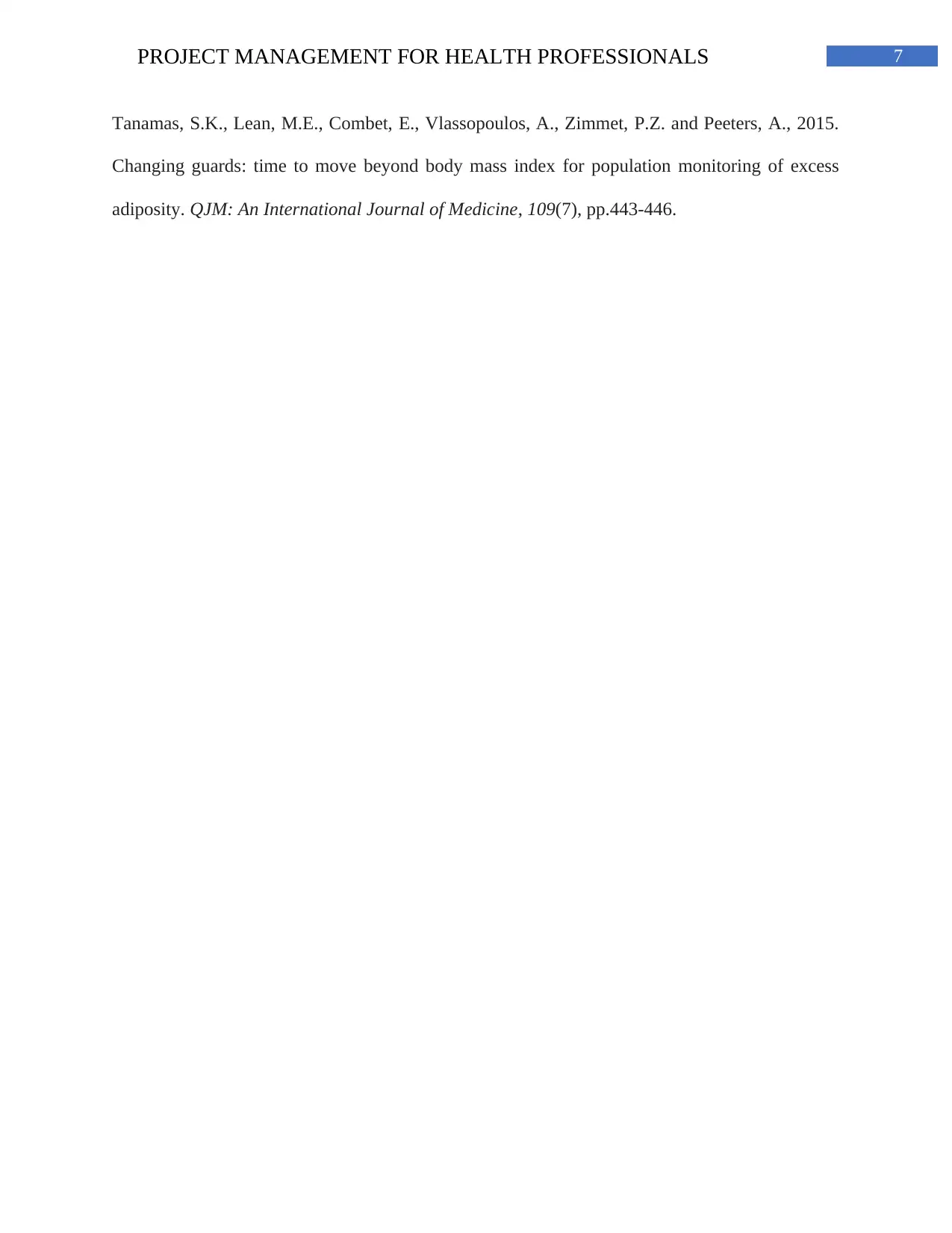
7PROJECT MANAGEMENT FOR HEALTH PROFESSIONALS
Tanamas, S.K., Lean, M.E., Combet, E., Vlassopoulos, A., Zimmet, P.Z. and Peeters, A., 2015.
Changing guards: time to move beyond body mass index for population monitoring of excess
adiposity. QJM: An International Journal of Medicine, 109(7), pp.443-446.
Tanamas, S.K., Lean, M.E., Combet, E., Vlassopoulos, A., Zimmet, P.Z. and Peeters, A., 2015.
Changing guards: time to move beyond body mass index for population monitoring of excess
adiposity. QJM: An International Journal of Medicine, 109(7), pp.443-446.
1 out of 8
Related Documents
Your All-in-One AI-Powered Toolkit for Academic Success.
+13062052269
info@desklib.com
Available 24*7 on WhatsApp / Email
![[object Object]](/_next/static/media/star-bottom.7253800d.svg)
Unlock your academic potential
© 2024 | Zucol Services PVT LTD | All rights reserved.





